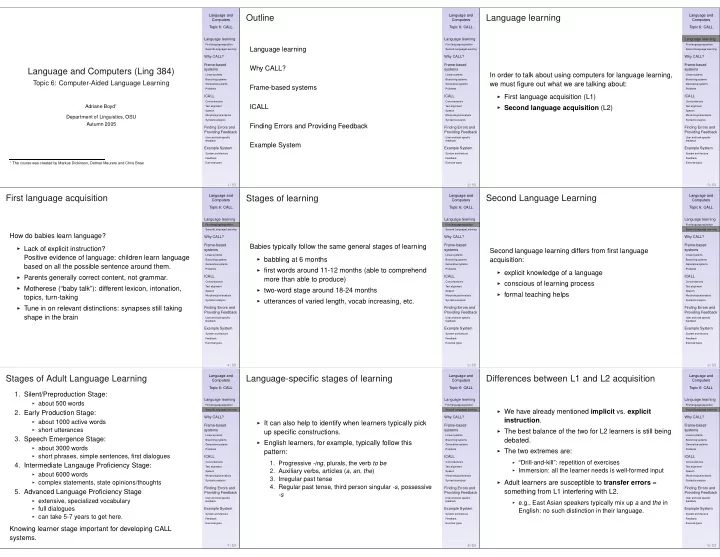

Language and Language and Language and Outline Language learning Computers Computers Computers Topic 6: CALL Topic 6: CALL Topic 6: CALL Language learning Language learning Language learning First language aquisition First language aquisition First language aquisition Language learning Second Language Learning Second Language Learning Second Language Learning Why CALL? Why CALL? Why CALL? Frame-based Frame-based Frame-based Why CALL? Language and Computers (Ling 384) systems systems systems In order to talk about using computers for language learning, Linear systems Linear systems Linear systems Branching systems Branching systems Branching systems Topic 6: Computer-Aided Language Learning we must figure out what we are talking about: Generative systems Generative systems Generative systems Frame-based systems Problems Problems Problems ◮ First language acquisition (L1) ICALL ICALL ICALL Concordancers Concordancers Concordancers Adriane Boyd ∗ ICALL ◮ Second language acquisition (L2) Text alignment Text alignment Text alignment Speech Speech Speech Morphological analysis Morphological analysis Morphological analysis Department of Linguistics, OSU Syntactic analysis Syntactic analysis Syntactic analysis Autumn 2005 Finding Errors and Providing Feedback Finding Errors and Finding Errors and Finding Errors and Providing Feedback Providing Feedback Providing Feedback User and task specific User and task specific User and task specific feedback feedback feedback Example System Example System Example System Example System System architecture System architecture System architecture Feedback Feedback Feedback ∗ The course was created by Markus Dickinson, Detmar Meurers and Chris Brew. Exercise types Exercise types Exercise types 1 / 53 2 / 53 3 / 53 First language acquisition Language and Stages of learning Language and Second Language Learning Language and Computers Computers Computers Topic 6: CALL Topic 6: CALL Topic 6: CALL Language learning Language learning Language learning First language aquisition First language aquisition First language aquisition Second Language Learning Second Language Learning Second Language Learning How do babies learn language? Why CALL? Why CALL? Why CALL? Frame-based Babies typically follow the same general stages of learning Frame-based Frame-based ◮ Lack of explicit instruction? systems systems Second language learning differs from first language systems Linear systems Linear systems Linear systems Positive evidence of language: children learn language ◮ babbling at 6 months acquisition: Branching systems Branching systems Branching systems based on all the possible sentence around them. Generative systems Generative systems Generative systems ◮ first words around 11-12 months (able to comprehend Problems Problems Problems ◮ explicit knowledge of a language ◮ Parents generally correct content, not grammar. ICALL ICALL ICALL more than able to produce) ◮ conscious of learning process Concordancers Concordancers Concordancers ◮ Motherese (“baby talk”): different lexicon, intonation, Text alignment Text alignment Text alignment ◮ two-word stage around 18-24 months Speech Speech Speech ◮ formal teaching helps topics, turn-taking Morphological analysis Morphological analysis Morphological analysis ◮ utterances of varied length, vocab increasing, etc. Syntactic analysis Syntactic analysis Syntactic analysis ◮ Tune in on relevant distinctions: synapses still taking Finding Errors and Finding Errors and Finding Errors and Providing Feedback Providing Feedback Providing Feedback shape in the brain User and task specific User and task specific User and task specific feedback feedback feedback Example System Example System Example System System architecture System architecture System architecture Feedback Feedback Feedback Exercise types Exercise types Exercise types 4 / 53 5 / 53 6 / 53 Language and Language and Language and Stages of Adult Language Learning Language-specific stages of learning Differences between L1 and L2 acquisition Computers Computers Computers Topic 6: CALL Topic 6: CALL Topic 6: CALL 1. Silent/Preproduction Stage: Language learning Language learning Language learning ◮ about 500 words First language aquisition First language aquisition First language aquisition ◮ We have already mentioned implicit vs. explicit Second Language Learning Second Language Learning Second Language Learning 2. Early Production Stage: Why CALL? Why CALL? Why CALL? instruction . ◮ about 1000 active words ◮ It can also help to identify when learners typically pick Frame-based Frame-based Frame-based ◮ short utterances ◮ The best balance of the two for L2 learners is still being systems up specific constructions. systems systems Linear systems Linear systems Linear systems 3. Speech Emergence Stage: debated. Branching systems ◮ English learners, for example, typically follow this Branching systems Branching systems Generative systems Generative systems Generative systems ◮ about 3000 words Problems Problems ◮ The two extremes are: Problems pattern: ◮ short phrases, simple sentences, first dialogues ICALL ICALL ICALL ◮ “Drill-and-kill”: repetition of exercises Concordancers 1. Progressive -ing , plurals, the verb to be Concordancers Concordancers 4. Intermediate Langauge Proficiency Stage: Text alignment Text alignment Text alignment ◮ Immersion: all the learner needs is well-formed input 2. Auxiliary verbs, articles ( a, an, the ) ◮ about 6000 words Speech Speech Speech Morphological analysis Morphological analysis Morphological analysis 3. Irregular past tense ◮ complex statements, state opinions/thoughts ◮ Adult learners are susceptible to transfer errors = Syntactic analysis Syntactic analysis Syntactic analysis 4. Regular past tense, third person singular -s , possessive Finding Errors and Finding Errors and Finding Errors and 5. Advanced Language Proficiency Stage something from L1 interfering with L2. Providing Feedback Providing Feedback Providing Feedback -s ◮ extensive, specialized vocabulary User and task specific User and task specific User and task specific ◮ e.g., East Asian speakers typically mix up a and the in feedback feedback feedback ◮ full dialogues Example System Example System Example System English: no such distinction in their language. ◮ can take 5-7 years to get here. System architecture System architecture System architecture Feedback Feedback Feedback Exercise types Exercise types Exercise types Knowing learner stage important for developing CALL systems. 7 / 53 8 / 53 9 / 53
Recommend
More recommend